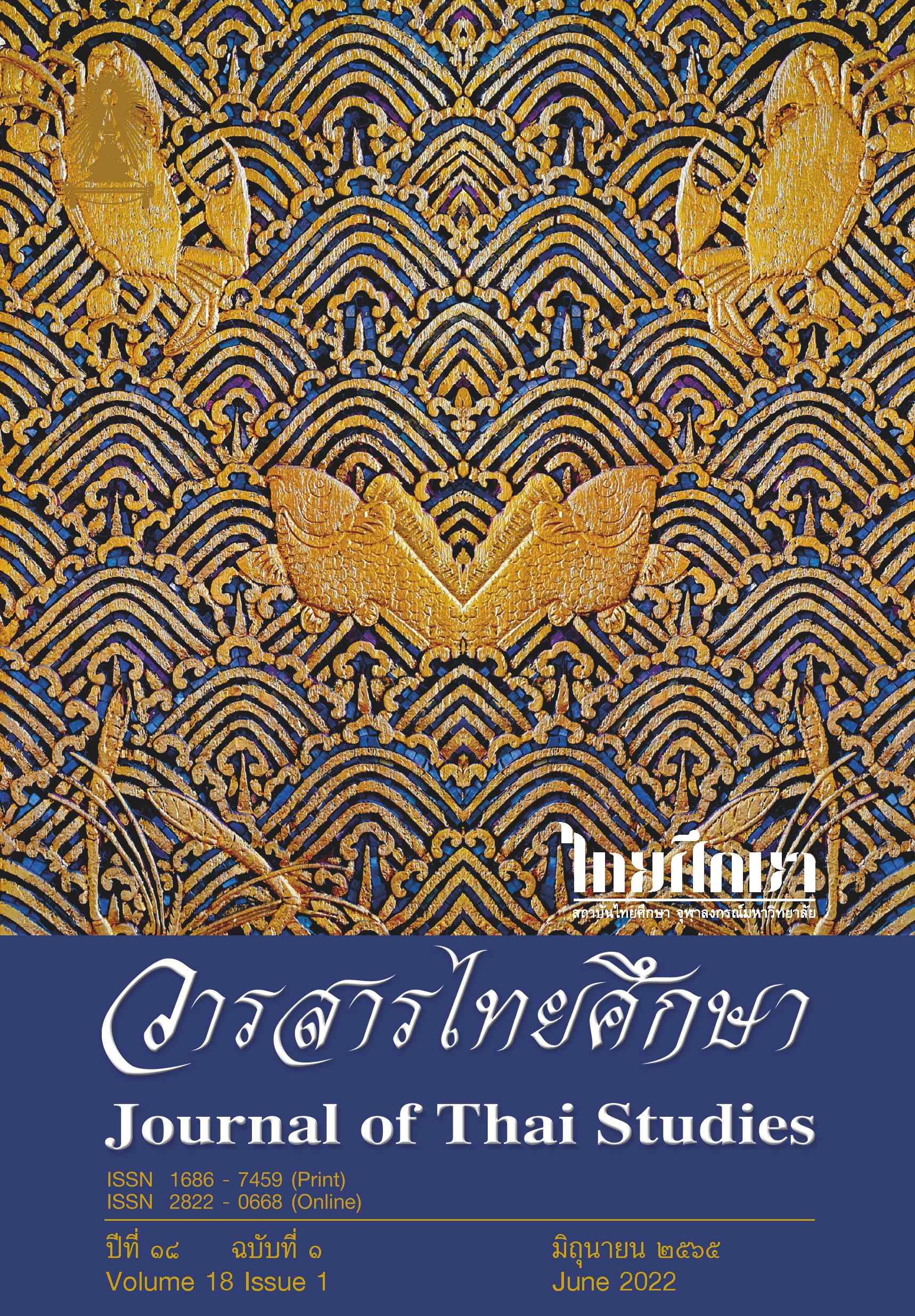Dynamics and the ways of thinking in creating the Songkran-Wan Lai Festival in the Eastern Region of Thailand
Main Article Content
Abstract
This article aims to study the ways of thinking in creating the Songkran–Wan Lai festival in the eastern region of Thailand and to analyze the dynamics of the Songkran tradition resulting from the ways of thinking of such creation. The study reveals that the Songkran-Wan Lai festival is a cultural occurrence to which various folklore in the locality has been applied, especially local traditions, rituals, beliefs and plays, to be a part of a tourist festival of the eastern region. There are various characteristics of creation, namely, transmission of existing traditions and rituals, revival of traditions and rituals, the combination of Songkran tradition with rituals in the fifth month to be the same festival, and a combination of rituals found in the eastern region to become a tourist festival, giving rise to the dynamics of the Songkran tradition from a rite of passage that focuses on fertility and peacefulness of communities to become a ritual with performance in the context of tourism and the creative economy.
Downloads
Article Details

This work is licensed under a Creative Commons Attribution-NonCommercial-NoDerivatives 4.0 International License.
Journal of Thai studies is licensed under a Creative Commons Attribution-Noncommercial-NoDerivatives4.0 Intenational (CC BY-NC-ND 4.0) licence, unless otherwise stated. Plese read our Policies page for more information on Open Access, copyright and permissions.
References
Bang Phra Sub-district Municipality. (2009). yon roi mueang bang phra [History of Bang Phra]. Chonburi: Suthipong.
Iaosiwong, N. (2014). Songkran: withichiwit thai thi plianplaeng [Songkran: A changing Thai way of life] In phakhaoma, pha sin, kangkeng nai, wa duai prapheni, khwam plianplaeng lae rueang sap pha sara [Loincloth, Sarong, Underwear and etc.: Traditions, charges and all thinge] (p.32-48). (2nd ed.). Bangkok: Matichon.
Kasemphonkun, A. (2016). Songkran nai wannakam lae tamnan khong khon tai - thai [Songkran tradition in the literature and legends of the Tai-Thai people] In Satnam Songkran watthanatham ruam rak echia [Splashing Water in Songkran Tradition: Shared Asia Cultone] (p.49-68). Bangkok: Office of the Basic Education Commission, Ministry of Education.
Mahakhan, P. (ed.). (1981). rai-ngan sammana watthanatham phaktawan-ok [Seminar report on culture in the eastern region of Thailand]. Chonburi: Srinakharinwirot University.
Nathalang, S. (2015). botsangkhro: phonlawat prapheni phithikam nai sangkhom thai ruam samai [Synthesis: The dynamics of ritual and traditions in contemporary Thai society] In Prapheni sangsan nai sangkhom thai ruam samai [Songkran Tradition in Contempore Thai Sociaety] (p.355-384). Bangkok: Princess Maha Chakri Sirindhorn Anthropology Centre (Public Organization).
Nathalang, S. (2019). khati chon sangsan bot sangkhro lae thruesadi [“Creative folklore”: synthesis and theory]. (2nd ed.). Bangkok: Princess Maha Chakri Sirindhorn Anthropology Centre (Public Organisation).
Nimmanhemin, P. and Tao, S. (1999). A pom thai tai khong nithan kap sangkhom [A pom Thai Tai Khong, Folktales and Society of the Tai Kong people]. Bangkok: Mae Kham Phang.
Sathiankoset. (1957). prapheni thai kiaokap thetsakan Songkran [Thai traditions related to the Songkran Festival]. Capital City: Division of Culture, Department of Religious Affairs, Ministry of Education.
Sophlainoi. (2004). Trut Songkran pramuan khwam pen ma khong pimai thai samai tang tang [Trut-Songkran Festival, A Compilation of the history of the Thai New Year in various periods]. (2nd ed.). Bangkok: Matichon.
Sujachaya, S. (2017). phithi kho fon khong chonchat thai [Rain Praying Rituals of the Tai Peoples] In Khati chon khon thai nai watthanatham khao [Tai Folklore in rice culture] (p.231-265). Bangkok: Institute of Thai Studies, Chulalongkorn University.
Sunalai, C. (2004). Revitalization of Wan Lai Tradition: Factors and Consequences, Bangsaen, Chonburi Province. (Master Thesis). Mahidol University, Nakhon Pathom, Thailand.
Van Gennep, A. (1960). The Rites of Passage. Chicago: University of Chicago Press.
Wanliphodom, S. (2017). sang ban paeng mueang [Establish a Country]. Bangkok: Matichon.
Wongthet, P. (1989). ekkasan kan son chut wicha sinlapa kan lalen lae kan sadaeng phuenban khong thai nuai thi 1-8 [Teaching Documents for Art Courses, Thai folk games and performances, units 1-8]. Nonthaburi: Sukhothai Thammathirat University.
Wongthet, S. (2016). rotnam satnam Songkran watthanatham ruam khong usakhane [Pouring water and splashing water: Songkran tradition in Southeast Asia, a common culture] In Satnam Songkran watthanatham ruam rak echia [Splashing Water in Songkran Tradition: Shared Asia Culture] (p.29-38). Bangkok: Office of the Basic Education Commission, Ministry of Education.
Personal Interview
Charoenphon, S. (2020, December 23). Personal Interview.
Homhuan, A. (2020, November 26). Personal Interview.


